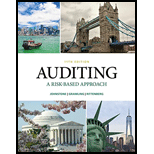
Concept explainers
a.
Introduction: In context of audit, materiality refers to the significance of an item or transaction in the books of accounts which have a direct bearing on the opinion of auditor and assessment of financial performance by users of financial statements.
To Define: Planning materiality and its practical application in audit.
b.
Introduction: Performance materiality refers to the significance assigned to an individual category of item(s) or transaction(s) by the auditor during the course of audit.
To define: Performance materiality and its practical application.
c.
Introduction: Posting materiality is that value of audit item or transaction which, if identified during audit, must be documented separately for subsequent consideration during the audit.
To define: Posting materiality and its application in audit.
d.
Introduction: Qualitative factors are those non-monetary considerations which are significant in the process of audit and have a direct bearing on
To Discuss: Impact of qualitative factors in quantitative materiality assessment.
Want to see the full answer?
Check out a sample textbook solution
Chapter 7 Solutions
Auditing: A Risk Based-Approach (MindTap Course List)
- 1. Explain the concepts of materiality and audit risk and the relationship between them? 2. Differentiate between the audit strategy and the audit plan. 3. Explain the term ‘analytical procedures’ and outline the different types of analytical procedures available to the auditor indicating situations in the audit when they can be used.arrow_forwardWhy determination of Materiality is a matter of Auditor Judgment? Explain both Qualitative and quantitative materiality assessments.arrow_forwardexplain how concepts of audit risk and materiality are related. must an auditor make a decision on materiality in order to determine the appropriate level of audit riskarrow_forward
- The auditor's assessment of the reliability and sufficiency of the information contained in the underlying accounting records is a part of ______________ a. Audit Test b. Comparison c. Evaluation d. Judgementarrow_forwardDefine the audit risk model and explain each term in the model.Also describe which two factors of the model when combined reflect the risk of materialmisstatements.arrow_forwardWhat are the objectives of an audit risk assessment? Explain why a risk assessment performed during audit planning sets the tone for the entire audit engagement. Also comment on how the concept of ‘risk assessment’ might be useful for any accountant at the outset of any assignment, including non-audit work.arrow_forward
- How does an audit team use materiality on an audit engagement?arrow_forwardDuring an audit, the internal auditor should consider the following factor(s) in determining the extent to which analytical procedures should be used: a. Adequacy of the system of internal control. b. Significance of the area being examined. c. Precision with which the results of analytical audit procedures can be predicted. d. All of the above.arrow_forward
 Auditing: A Risk Based-Approach (MindTap Course L...AccountingISBN:9781337619455Author:Karla M Johnstone, Audrey A. Gramling, Larry E. RittenbergPublisher:Cengage Learning
Auditing: A Risk Based-Approach (MindTap Course L...AccountingISBN:9781337619455Author:Karla M Johnstone, Audrey A. Gramling, Larry E. RittenbergPublisher:Cengage Learning Auditing: A Risk Based-Approach to Conducting a Q...AccountingISBN:9781305080577Author:Karla M Johnstone, Audrey A. Gramling, Larry E. RittenbergPublisher:South-Western College Pub
Auditing: A Risk Based-Approach to Conducting a Q...AccountingISBN:9781305080577Author:Karla M Johnstone, Audrey A. Gramling, Larry E. RittenbergPublisher:South-Western College Pub

